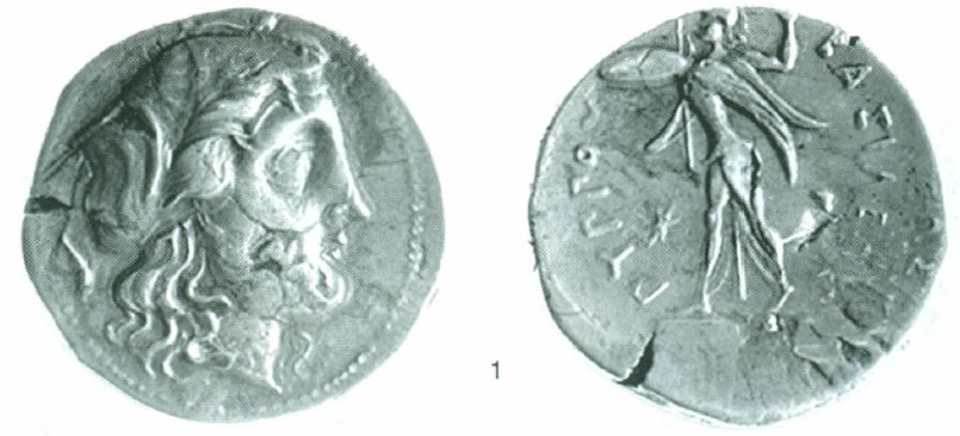278 BCE - 275 BCE | BAΣΙΛΕΩΣ ΠΥΡΡΟΥ
Overstriking coin
SO_186_-_Syracuse_(octobol_Persephone-Athena).jpg
Overstruck variety
186_Corinth_Pegasus-Athena.jpg
| Museum collectionMuseum collection:
|
Bruxelles, Bibliothèque royale de Belgique, II 89507
|
Sale(s)Sale(s) ᵖ:
|
Galerie des Monnaies et Antiquités (Paolucci-Luxembourg) 1, 26 Sept. 1998, 47.
|
|
|
|
Description
| ObverseInscription or printing placed on the obverse.:
|
Head of Persephone right, wearing earings, necklace and corn wreath. In field, dolphin. Border of dots.
|
ReverseInscription or printing placed on the reverse.:
|
BAΣΙΛΕΩΣ ΠΥΡΡΟΥ (Greek) Athena Promachos left, wearing chiton and himation, holding spear and shield. in field, thunderbolt and cornucopia.
|
Mint and issuing power
Chronology
| FromIdentifies the initial date in a range assigned in a numismatic context. 278 BCE toIdentifies the final date in a range assigned in a numismatic context.. 275 BCE
|
Hellenistic 323-30 BC  periodTime period of the numismatic object. periodTime period of the numismatic object.
|
Physical description
MetalThe physical material (usually metal) from which an object is made.: Silver 
|
WeightWeight of the numismatic object (in grams). in grams: 7.837.83 g <br />7,830 mg <br />
|
DenominationTerm indicating the value of a numismatic object. Examples: tetradrachm, chalkous, denarius.: octobol 
|
AxisDescribes the directional relationship between the obverse and reverse of a numismatic object.: 77 mm <br />0.7 cm <br />
|
| DiameterDescribes diameter of an object (in mm).: 2323 mm <br />2.3 cm <br />
|
StandardStandard.: Attic
|
References
Description
| ObverseInscription or printing placed on the obverse.:
|
Pegasus flying left.
|
ReverseInscription or printing placed on the reverse.:
|
Athena left with a corinthian helmet.
|
Mint and issuing power
| MintIdentifies the place of manufacture or issue of a numismatic object. ᵖ:
|
Corinth
|
Ancient regionAncient region. ᵖ
|
Peloponnesus
|
Modern countryModern country: Greece
|
AuthorityIdentifies the authority in whose name (explicitly or implicitly) a numismatic object was issued. ᵖ:
|
|
Chronology
| FromIdentifies the initial date in a range assigned in a numismatic context. 350 BCE toIdentifies the final date in a range assigned in a numismatic context.. 278 BCE
|
periodTime period of the numismatic object.
|
Physical description
| DenominationTerm indicating the value of a numismatic object. Examples: tetradrachm, chalkous, denarius. ᵖ:
|
stater 
|
|
|
References
References
- ^ Gardner, Percy (1883), A Catalogue of the Greek coins in the British Museum. vol. V : Thessaly to Aetolia, London, The Trustees, p. 234, pl. 32.
- ^ Callataÿ, François de (2000), "Un “octobole” de Pyrrhus surfrappé sur un statère de type corinthien. Réflexions sur les masses monnayées par Pyrrhus en or et en argent", Annali. Istituto Italiano di Numismatica, 47, p. 189-213, pl. XII-XV.
- ^ Hoover, Oliver D. (2016), Handbook of coins of Macedon and its neighbors. 3. Part I: Macedon, Illyria, and Epeiros, sixth to first centuries BC, Lancaster, 437 p.
- ^ Ravel, Oscar E. (1948), Les "Poulains" de Corinthe : monographie des statères corinthiens. Tome II: (de 414 à 300 J. C.), London, 310 p., 54 pls.

